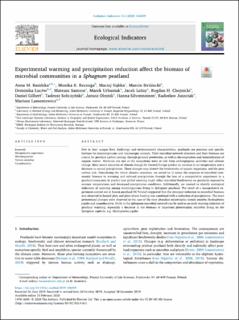Experimental warming and precipitation reduction affect the biomass of microbial communities in a Sphagnum peatland
Basinska, Anna M.; Reczuga, Monika K.; Gabka, Maciej; Strozecki, Marcin; Lucow, Dominika; Samson, Mateusz; Urbaniak, Marek; Lesny, Jacek; Chojnicki, Bogdan H.; Gilbert, Daniel; Sobczynski, Tadeusz; Olejnik, Janusz; Silvennoinen, Hanna Marika; Juszczak, Radoslaw; Lamentowicz, Mariusz
Peer reviewed, Journal article
Published version
Permanent lenke
https://hdl.handle.net/11250/2684880Utgivelsesdato
2020-02-15Metadata
Vis full innførselSamlinger
Sammendrag
Due to their unique flora, hydrology and environmental characteristics, peatlands are precious and specific habitats for microorganisms and microscopic animals. Their microbial network structure and their biomass are crucial for peatland carbon cycling, through primary production, as well as decomposition and mineralization of organic matter. Wetlands are one of the ecosystems most at risk from anthropogenic activities and climate change. Most recent scenarios of climate change for Central Europe predict an increase in air temperature and a decrease in annual precipitation. These changes may disturb the biodiversity of aquatic organisms, and the peat carbon sink. Considering the above climatic scenarios, we aimed to: i) assess the response of microbial community biomass to warming and reduced precipitation through the lens of a manipulative experiment in a peatland ecosystem ii) predict how global warming might affect microbial biodiversity on peatlands exposed to warmer temperatures and decreased precipitation conditions. Additionally, we wanted to identify ecological indicators of warming among microorganisms living in Sphagnum peatland. The result of a manipulative experiment carried out at Rzecin peatland (W Poland) suggested that the strongest reduction in microbial biomass was observed in heated plots and plots where heating was combined with a reduction of precipitation. The most pronounced changes were observed in the case of the very abundant mixotrophic testate amoeba Hyalosphenia papilio and cyanobacteria. Shifts in the Sphagnum microbial network can be used as an early warning indicator of peatland warming, especially a decrease in the biomass of important phototrophic microbes living on the Sphagnum capitula, e.g. Hyalosphenia papilio.

